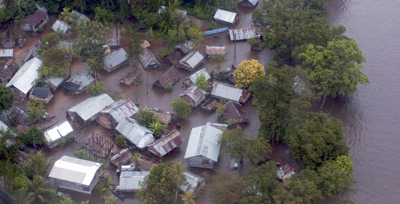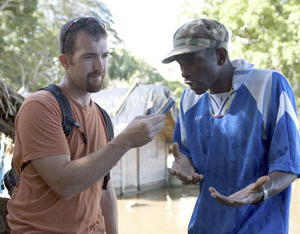
As the muddy floodwaters of Suriname’s Tapanahoni River recede, thousands of Aukan villagers who live along the river are welcoming a flood of a another kind: help, and lots of it.
Rice, anti-malaria drugs, gasoline and hundreds of thousands of dollars in relief funds are pouring into the country’s waterlogged interior, and the International Mission Board is playing a critical role in addressing what the Surinamese government calls an “unprecedented” crisis.
Days of torrential rains swamped Suriname’s remote rainforest during the week of May 8, forcing an estimated 22,000 people from their homes and severely affecting another 15,000, according to a United Nations disaster assessment and coordination team. At their height, floodwaters inundated more than 10,000 to 15,500 square miles as rivers rose to levels not seen in recent memory.
 IMB missionary Charles Shirley, left, and radio DJ Baa Beele travel by boat to villages on the banks of Tapanahoni River to interview flood victims.
IMB missionary Charles Shirley, left, and radio DJ Baa Beele travel by boat to villages on the banks of Tapanahoni River to interview flood victims.Some 60 percent of the population along the Tapanahoni River alone was displaced by the flooding, including Aukaners evacuated from four island villages near the home of IMB missionaries Charles and Brittany Shirey. The Shireys run a radio ministry to share the gospel of Jesus Christ with the Aukaners. Since the flood, however, the station has been pulling double duty, broadcasting both Bible stories and news about the disaster.
Charles Shirey said the station is acting as a key communications hub during the crisis due to the extreme isolation of the Aukan people. More than 100 miles from the nearest road, their villages are accessible only by air or by boat. They live so deep in the jungle that no television, cell phones or any other means of electronic communication can reach them – except Radio Paakati.
Besides rallying prayer, the station’s biggest boon has been its ability to coordinate logistics, letting villagers know when and from where help is coming. Shirey said Radio Paakati is airing reports about locations for food distribution, tips for combating flood-spawned illnesses such as malaria and diarrhea, and even live interviews with aid organizations and government officials working to get more help to people in the interior.
Though most villages have no electricity, Aukaners are able to listen to the station with battery-powered radios. Paakati normally broadcasts every night, but the flooding has created the need for two hours of programming in the morning and afternoon. Shirey said the station has remained on the air since the flooding began, thanks to a gas generator, 15-foot stilts as the studio’s foundation and a back-up plan: a DJ and emergency studio on top of the mountain where the radio station’s transmitter stands. Most important of all, Shirey said, the Bible stories and Christian music the station plays have not stopped either.
Though its gospel message has met resistance from a few Aukan leaders, the station’s service during the flood has only strengthened its standing in the community.
However, broadcasting news bulletins and Bible stories has not been the IMB’s only response to the disaster. The Southern Baptist missions entity also has released an initial $22,000 for relief work. IMB strategy coordinator Tim McClard said the money primarily is being used to airlift thousands of food packets and other aid material from Suriname’s capital, Paramaribo, to dozens of small airstrips scattered throughout the interior.
Shirey hopes the biggest impact from the IMB’s relief work in Suriname will be eternal. He said God is using the flood to soften hearts to the gospel. Shirey recounted an instance when he was approached by a man while unloading food at an airstrip. The man asked if he could get his wife and children to the city. Once they were in the air, the man asked Shirley how he could learn more about the Bible stories he had heard on the radio.